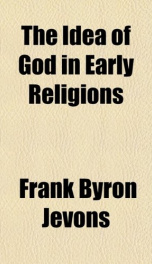The Idea of God in Early Religions

Purchase of this book includes free trial access to www.million-books.com where you can read more than a million books for free. This is an OCR edition with typos. Excerpt from book: II THE IDEA OP GOD IN MYTHOLOGY The idea of God is to be found, it will be generally admitted, not only in monotheistic religions, but in polytheistic religions also; and, as polytheisms have developed out of polydaemonism, that is to say, as the personal beings or powers of polydaemonism have, in course of time, come to possess proper names and a personal history, some idea of divine personality must be admitted to be present in polydaemonism as well as in polytheism; and, in the same way, some idea of a personality greater than human may be taken to lie at the back of both polydaemonism and fetishism. If we wish to understand what ideas are in a man's mind, we may infer them from the words that he speaks and from the way in which he acts. The most natural and the most obvious course is to start from what he says. And that is the course which was followed by students of the history of religion, when they desired to ascertain what idea exactlyn] MYTHS AND TALES 31 man has had of his gods. They had recourse, for the information they wanted, to mythology. Later on, indeed, they proceeded to enquire into what man did, into the ritual which he observed in approaching his gods ; and, in the next chapter, we will follow them in that enquiry. But in this chapter we have to ask what light mythology throws upon the idea man has had of his gods. Before doing so, however, we cannot but notice that mythology and polytheism go together. Fetishism does not produce any mythology. Doubtless, the owner of a fetish which acts knows and can tell of the wonderful things it has done. But those anecdotes do not get taken up into the common stock of knowledge; nor are they handed down by the common consciousness to all succeeding generations of the community. Mythology, like language, is ...
Info about the book
Author:
Series:
Unknown
ASIN:
B0082XC3VG
Rating:
1/5 (40)Your rating:
0/5
Languge:
English
Users who have this book
Users who want this book
What readers are saying
What do you think? Write your own comment on this book!
write a commentif you like The Idea of God in Early Religions try:
Other books by this author
Do you want to read a book that interests you? It’s EASY!
Create an account and send a request for reading to other users on the Webpage of the book!

